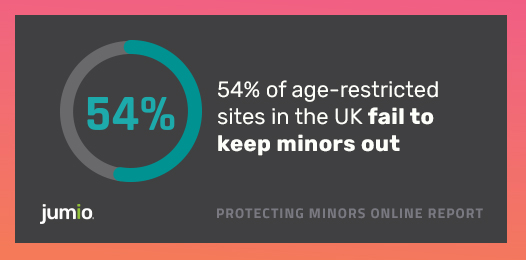
New research from Jumio reveals 46% of organisations rely on older, more anonymous forms of age verification that do not impair online conversion rates
Jumio, the leading provider of AI-powered end-to-end identity verification and authentication solutions, today launched a new report revealing that 54% of UK age-restricted sites have been unable to prevent minors from accessing their products or services despite over two-thirds (67%) believing it is their responsibility to prevent this from happening.
The report, Protecting Minors Online: Methods and mindsets of businesses operating in age-restricted industries, reveals the perspectives of UK businesses in this space and what steps are being taken to prevent underage access.
The research, conducted by Vitreous World, questioned 200 UK-based tech decision-makers within organisations that sell or offer age-restricted products or services. It comes amidst mounting pressure for online companies to better protect minors from online harm, with Ofcom set to take a leading role in enforcing new rules. The report finds that:
- An overwhelming majority (95%) say that it is important for them to ensure minors do not access their services or products, but many (56%) are failing at the first hurdle by relying on inherently weak, more anonymous forms of age verification
- Over a quarter (26%) depend on a self-assessment form, 20% use document verification and a further 10% employ the use of a credit check report to verify a user’s age
- Those selling products, such as alcohol or fireworks, are less likely (50%) to depend on weak age-verification methods than those offering a service, like pornography (71%), where the perceived harm is somewhat less tangible
As age-restricted sites begin to address their accountability, Jumio’s report explores the challenges these organisations face when it comes to implementing robust age-verification technologies. For almost half (45%) of the respondents, it is important that a technology can genuinely verify a user’s age, while having a negative impact on conversion rates (36%) and creating a disjointed customer experience (33%) are perceived as the key reasons why organisations might choose not to implement the most effective stand-alone age-verification method.
“It is completely appropriate to hold any organisation that profits from selling age-restricted products and services accountable for the potential harms caused by their platform,” said Robert Prigge, Jumio CEO. “That said, Ofcom needs to take a risk-based approach to age verification, depending on the industry and the likely harm of onboarding a bad actor. That is, the greater the likelihood of social harm, the greater the need for more robust forms of non-anonymous methods of age verification. With many minors at home in the UK right now due to pandemic lockdown measures and spending more time online, it is vital that organisations are looking to the most appropriate methods of age verification to truly prevent harm.”
Download the full report here for additional learnings and insights.
About Jumio
When identity matters, trust Jumio. Jumio’s mission is to make the internet a safer place by protecting the ecosystems of businesses through cutting-edge online identity verification and authentication services that quickly and accurately connect a person’s online and real-world identities. Jumio’s end-to-end identity verification solutions fight fraud, maintain compliance and onboard good customers faster.
Leveraging advanced technology including informed AI, biometrics, machine learning, certified 3D liveness detection and human review, Jumio helps organizations meet regulatory compliance including KYC, AML and GDPR and definitively establish the digital identity of their customers. Jumio has verified more than 225 million identities issued by over 200 countries and territories from real-time web and mobile transactions. Jumio’s solutions are used by leading companies in the financial services, sharing economy, digital currency, retail, travel and online gaming sectors. Based in Palo Alto, Jumio operates globally with offices in North America, Latin America, Europe and Asia Pacific and has been the recipient of numerous awards for innovation.
For more information, please visit www.jumio.com.
About the research
The online survey was conducted by Vitreous World between the 11th and 17th of March 2020. It targeted 200 tech decision-makers within organisations that sell or offer age-restricted products or services to understand their thoughts on responsibility and importance of protecting minors, as well as their possible reluctance in investing in proper safeguarding and age-verification technologies and what would make them more likely to do so.
Media Contact
Gemma Lingham
FleishmanHillard Fishburn
[email protected]
+44-7525-699-347
